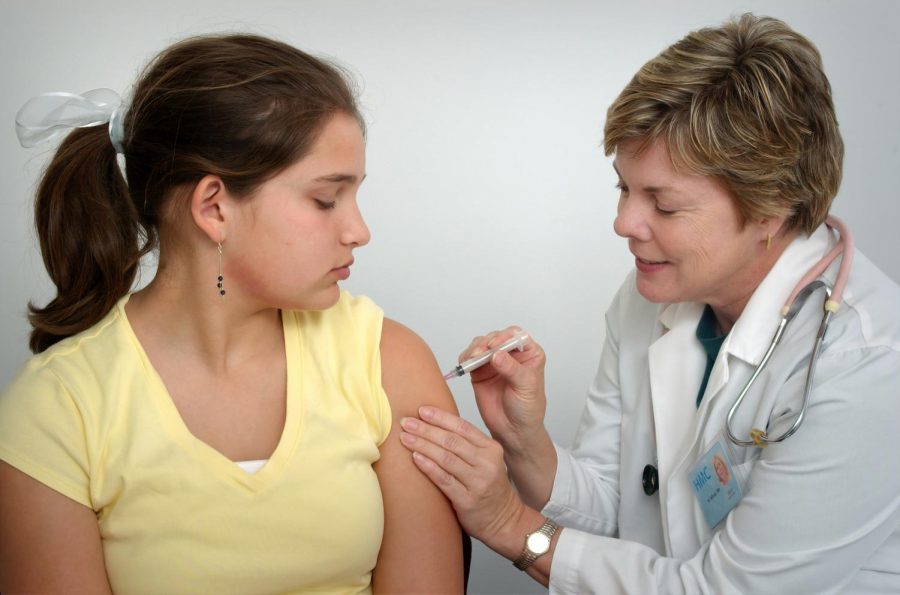OPINION: Should minors have access to COVID-19 vaccine without parental consent?
Photo by CDC on Unsplash
The nurse depicted in this 2006 photograph, was in the process of administering an intramuscular vaccination in the left shoulder of a young girl. The nurse was pinching the overlying shoulder skin, in order to immobilize the injection site.
Various COVID-19 vaccines have been in development since the virus was first identified in December 2019 in Wuhan, China. Pharmaceutical companies and scientists worldwide have been scrambling for the past year to develop a safe and effective vaccine that could be readily distributed.
There are currently 55 human trials being conducted with a variety of COVID-19 experimental vaccines. Pfizer, Moderna and AstraZeneca are just a few of the major companies that are receiving positive results from their vaccine in human trials.
Breaking news emerged recently as the U.K. became the first country to approve the vaccine developed by Pfizer and its partner BioNTech. Distribution and administration of vaccines will commence next week, starting with individuals living in nursing homes. The results of the Phase 3 trial showed that the vaccine made by Pfizer/BioNTech was 95% effective in preventing infections.
In the United States, public health and safety is a political matter. Therefore, there will always be opposing sides to new medical developments, especially when they have the potential to be mandated. Some people are arguing that theses vaccines have been rushed and could therefore pose unforeseen side effects, reactions or other health consequences.
They are reluctant to trust the vaccine considering the short amount of time it has been in development and trial. In fact, a Gallup poll from August found that one in three Americans would reject a cost-free COVID-19 vaccine.
Others are supporting the vaccine since the pandemic has disrupted normalcy for months and claimed nearly 1.5 million lives worldwide. These people are putting their trust in the scientists who have been working nonstop to develop a safe and effective vaccine.
With two opposing viewpoints, one of the major questions circulating throughout the nation is “should minors be able to receive the vaccine without parental consent?”
It’s important to validate the concerns of those fearful of the vaccine, especially when the safety of their children is in question. Unforeseen side effects, reactions or other health complications are all very real things that could result from the vaccine. However, it is also important to remember that scientists worldwide have been solely devoted to developing a safe and effective vaccine for the past year. This is an army of scientists, not a small group in a lab trying to figure the problem out themselves.
Nine states in the U.S. allow minors to receive vaccines without parental consent. Five of those states allow minors to consent to any healthcare service with the exception of abortions.
The rational decision part of the human brain is in development until the age of 25. At the age of 18, teens are considered adults and have the ability to make judgements using the knowledge and decision-making skills they possess. Teens under 18 years old undergo a tremendous amount of development, both mentally and physically. Biologically, minors do not have the capacity to make mature, rational decisions about important matters such as their own health.
While it is entirely true that minors have the capacity to recognize the devastation that COVID-19 has caused, they shouldn’t be able expose themselves to a brand-new vaccine without parental consent. The risk of the unknown is simply too high for minors to subject themselves to. Once we learn more about not only the vaccine but the virus itself, then we can consider the possibility of teens consenting for themselves.
There are several resources available to teens for free information regarding their health. Vaxteen.org is an organization that provides free information to teens about their health and preventable diseases. The website also contains information about every state regarding parental consent laws. Furthermore, the organization provides a variety of vaccine guides, including a personalized quiz for recommended vaccines.
Before we begin allowing teens to receive new medical treatments without parental consent, it’s crucial that more organizations like VaxTeen exist. Education about health and preventative medicine needs to be more widespread before our nation allows minors to make crucial decisions about their own healthcare.











